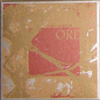 In a perfect world, Marielle Jakobsons' blackened and visceral monster of a solo debut would cause legions of uninspired drone artists to smash their laptops and sine oscillators in frustration and scurry about trying to find something else to do. I suspect that probably will not happen, but Ore is nevertheless one singularly scary, fully-formed, and brilliant work.
In a perfect world, Marielle Jakobsons' blackened and visceral monster of a solo debut would cause legions of uninspired drone artists to smash their laptops and sine oscillators in frustration and scurry about trying to find something else to do. I suspect that probably will not happen, but Ore is nevertheless one singularly scary, fully-formed, and brilliant work.
I was unfamiliar with any of Marielle Jakobsons' work prior to hearing Ore, but she is perhaps best known as one half of the electroacoustic chamber music duo Myrmyr (though she has also worked with folks like Pauline Oliveros, Terry Riley, Fred Frith, and Iannis Xenakis' UPIC machine in various capacities).Also, she has recently begun collaborating with Gregg Kowalsky in the Indian classical music-inspired Date Palms.However, neither of those groups has released an official album yet, so Darwinsbitch will likely be most people's first exposure to Jakobsons' artistry.Fortunately, that is exactly how it should be: while both projects are intriguing and show that Marielle is quite a versatile musician (she is a classically-trained violinist/pianist), neither comes close to capturing the sheer heaviness and demonic slow-burning intensity that she is capable of on her own.
Ore begins with sound of a cold wind and an ominous, oscillating low drone.Gradually, "Iron Lake" coheres into a quivering haze of electronics being slowly sawed apart by the bowing of an electrified violin before eventually giving way to a haunting interlude of melancholy strings and cavernous low-end surges.Other elements are subtly added, such as mysterious field recordings, foreboding rumblings, and heavily reverbed piano, but the atmosphere remains stark, unsettling, and eerily beautiful throughout the course of its eleven minutes.I am struck by the sheer purposefulness of Jakobsons' aesthetic: while often quite dense and complex, it never seems like there is anything extraneous or left to chance.Being that meticulous can often lead to music that feels overworked or listless, but Ore is both decidedly organic and coursing with dark emotion.
The rest of the album unfolds in similarly excellent and crushing fashion, but I especially enjoyed "Induction Cuts" and "Shadow-Leaves."  The former begins with swirling, clashing wall of dissonant drones before dissipating into a solo mournful violin and some odd hollow metallic percussion supported by a shifting disquieting thicket of notes of varying textures.The closing piece, "Shadow-Leaves," fades in with a gradually intensifying sheet of glimmering, shuddering ambiance before being joined by a creepy plinking piano and a snarl of microtonally shifting and snaking violin drones.As it progresses, the focus glacially shifts between instruments and motifs and balances beautifully between tension, atmosphere, and musicality.I especially loved the bizarre detuning (Indian?) stringed instrument interlude near the end.
This is, quite simply, a staggering album.Jakobsons is a master at her craft: her understanding of nuance, dynamics, harmony, and tension is without peer in the drone genre.I have absolutely no idea where she can go from here.While I am understandably loath to disparage the immortal Charlie Daniels Band, I think Satan would probably be far more intimidated and unnerved by the fiddlin' on Ore than the ostentatious shredding featured in "The Devil Went Down to Georgia."
Samples:
 
Read More

